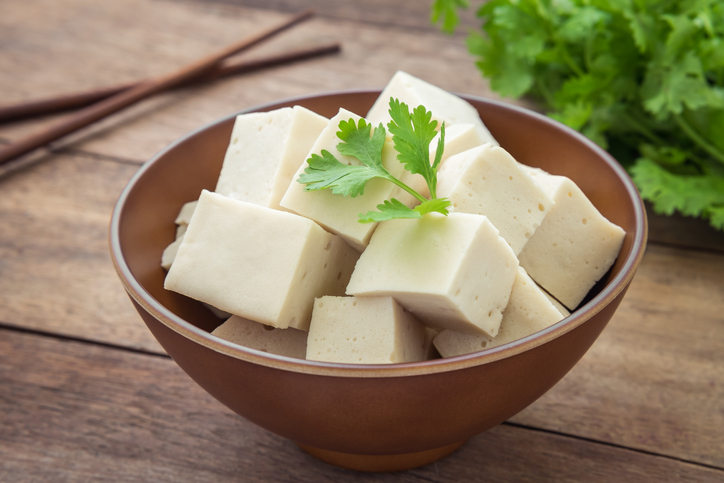Many different foods are made from soya beans, a type of legume. These foods are popular choices in many Chinese and Japanese diets. They are consumed as soya beans such as edamame, products such as drinks or as tofu. Soya-based products can also be fermented to produce tempeh and miso.
Soya foods (or US spelling, soy) are now popular in the UK. They are consumed in different forms, mainly as a plant-based alternative to dairy milk. Soya products are also available as plain or flavoured dessert items, as plain or marinated tofu, or as burgers or mince.

Soya fits in with UK government dietary recommendations for healthy and environmentally sustainable diets. The Eatwell Guide advises consuming ‘more beans and pulses’ balanced with less meat and dairy. Soya drinks and yoghurt alternatives are also included in the dairy and alternatives section.
Why choose soya?
You may choose soya because of problems consuming dairy, for example cows’ milk allergy or lactose intolerance. Some people believe soya foods to be healthier, particularly in relation to heart disease risk, or reduction in menopausal symptoms.
About five per cent of the UK population are now vegan or vegetarian. Many people consume less meat and dairy, choosing plant protein foods for environmental reasons. Some simply prefer the taste and variety of soya-based foods now available.
Is soya nutritious?
Soya products provide a very good source of many nutrients. These include protein, unsaturated fats, fibre and various vitamins and minerals.
Most soya drinks (‘milk’) are fortified to ensure that they match or exceed micronutrients usually found in dairy milk. These are usually calcium, iodine, vitamins B2, B12 and D. Organic products are not fortified.
Isoflavones
Soya contains other components that may have effects on health. There is particular interest in isoflavones. Isoflavones are a type of phytoestrogen. These are plant components with a similar structure to the hormone oestrogen.
Although the oestrogenic activity of isoflavones found in soya foods are different and much weaker than oestrogen produced in the body, there has been a lot of research investigating whether dietary intakes may have health benefits.
Soya and heart disease
Lower levels of heart disease have been observed in the Asian population consuming soya products. This led to interest in whether soya can reduce the risk of heart disease or whether the differences were due more to Asian populations consuming fewer dairy foods in adulthood, associated with saturated fats.
Many large studies demonstrated that consuming soya resulted in lower cholesterol levels in people with high cholesterol. Food labelling authorities in the UK, USA and Japan have approved statements that including '25g of soya protein per day can help reduce blood cholesterol levels'.
However, an assessment by the European Food Safety Authority in 2010, rejected proposals linking soya proteins and cholesterol-lowering effects.
Soya and menopausal symptoms
A common symptom of menopause is hot flushes, associated with a decline in oestrogen levels.
Research published in 2012 reported that consuming soya isoflavones resulted in at least a 20% reduction in frequency and severity of flushes. You may find these beneficial, but less potent than the use of Hormone Replacement Therapy (HRT), which may be advised in more severe cases. Find out more in the BDA Menopause Food Fact Sheet.
Soya and cancer
Low risks of prostate cancer have been observed in Chinese men, suggesting typically higher soya consumption has a possible protective association. Some studies have suggested a slower rise in prostate cancer risk markers in patients with higher intakes of isoflavones.
Lower rates of breast cancer risk in Asian women also indicate possible protective effects, particularly linked to eating more soya foods in childhood and adolescence4. Studies suggest reductions in breast cancer recurrence associated with greater soya consumption.
These suggestions are backed up by a review by the American Institute for Cancer Research, the American Cancer Society and the World Cancer Research Fund.
Adverse effects
Studies consistently show that eating soya foods does not affect levels of any hormones in men. Adverse effects on fertility or sexual health have not been reported either. There have been concerns about possible effects of soya-based formula in infants, as isoflavone intakes would be proportionally much greater compared with adults.
The BDA advises that soya-based formula should only be used in exceptional circumstances in particular young infants, to ensure adequate nutrition.
If you take thyroid medication, ask your doctor or dietitian for advice on consuming soya products. There are no harmful effects on normal thyroid function, but soya may interfere with absorption of thyroid medication.
Soya and plant proteins for a more sustainable planet and better health
The government’s dietary recommendations, the Eatwell Guide (2016), recommends a significant shift toward more plant-based eating both for the nation’s health as well as a more sustainable planet. Over 75% of the Eatwell Guide is made up of plant foods. The most notable change is to the protein section, which recommends plant-based proteins over animal proteins.
A significant percentage of the global soya crop is grown in the Amazon rainforest, contributing to its destruction. The majority of this soya is used to feed industrialised livestock. However, soya grown for food and drink for human consumption in the UK and Europe is grown in many different countries. Check with individual manufacturers.
Top tips
- Research on soya foods is ongoing, but it is clear that soya is a nutritious and useful part of the diet which fits well with healthy eating guidelines and may have multiple health benefits
- Check that soya drinks are fortified (unless there is a specific preference for organic products.) Retailers' own-label products may be less expensive than brands
- Many soya dessert products are now available. Choose those with lower sugar contents by checking nutrition information of food labels
- Tofu is an excellent high protein food to add to meals. But some addition of spices or sauce is needed to add flavour. Many recipe suggestions are available
- The use of soya formula for infants who have intolerance or allergy to cows’ milk, should only be used after the age of six months. Dietitians will be able to provide specific guidance
- Those on thyroid medication should seek health professional advice with regards to soya consumption
- Soya-based formula for infant feeding should only be used in exceptional circumstances
Source(s)
- Public Health England / PHE (2016) The Eatwell Guide https://www.nhs.uk/live-well/eat-well/food-guidelines-and-food-labels/the-eatwell-guide/
- Stewart C, Piernas C, Cook B, Jebb S (2021) Trends in UK meat consumption: analysis of data from years 1n- 11 (2008/9 – 2018/19) of the National Diet and Nutrition Survey rolling programme. The Lancet Planetary Health, 5,10, E699-708
- British Nutrition Foundation / BNF (2002). Soya and Health. Briefing Paper. London: BNF
- Messina M (2016) Soy and Health Update: Evaluation of the Clinical and Epidemiologic Literature. Nutrients, 8,12,754
- Taku, K, Umegaki, K, Sato, Y (2007) Soy isoflavones lower serum total and LDL cholesterol in humans: a meta-analysis of 11 randomized controlled trials. American Journal of Clinical Nutrition, 85: 1148–1156.
- Zhuo, XG, Melby, MK and Watanabe, S (2004) Soy isoflavone intake lowers serum LDL cholesterol: a meta-analysis of 8 randomized controlled trials in humans. Journal of Nutrition, 134, 2395–2400.
- Anderson, JW and Bush, HM (2011) Soy protein effects on serum lipoproteins: a quality assessment and meta-analysis of randomized, controlled studies. Journal of the American College of Nutrition, 30, 79–91
- Zhan, S and Ho, SC (2005) Meta-analysis of the effects of soy protein containing isoflavones on the lipid profile. American Journal of Clinical Nutrition, 81, 397–408.
- Sirtori, CR, Eberini, I, Arnoldi, A (2007). Hypocholesterolaemic effects of soya proteins: results of recent studies are predictable from the Anderson meta-analysis data. British Journal of Nutrition, 97:816–822.
- Harland, J and Haffner, TA (2008) Systematic review, meta-analysis and regression of randomised controlled trials reporting an association between an intake of circa 25 g soya protein/day and blood cholesterol. Atherosclerosis, 200, 13–27.
- European food Safety Authority / EFSA (2010) Scientific Opinion on the substantiation of a health claim related to soy protein and reduction of blood cholesterol concentrations pursuant to Article 14 of the Regulation (EC) No 1924/2006 https://www.efsa.europa.eu/en/efsajournal/pub/1688
- Clarkson, TB, Utian, WH, Barnes, S, et al (2011). The role of soy isoflavones in menopausal health: report of The North American Menopause Society/Wulf H. Utian Translational Science Symposium in Chicago, IL. Menopause 18,732-753
- Nagata, C, Takatsuka, N, et al (2001). Soy product intake and hot flashes in Japanese women: results from a community-based prospective study. American Journal of Epidemiology,153:790-3
- Taku, K, Melby MK, Kronenberg F, Kurzer MS and Messina M (2012) Extracted or synthesized soybean isoflavones reduce menopausal hot flash frequency and severity: systematic review and meta-analysis of randomized controlled trials. Menopause 19,7,776-90
- American Institute for Cancer Research AICR (2021) Soy: Intake does not increase risk for breast cancer survivors. https://www.aicr.org/cancer-prevention/food-facts/soy/
- Shu, XO, Zheng Y, Cai H, Gu K, Chen Z, Zheng W and Lu W (2009). Soy food intake and breast cancer survival. Journal of the American Medical Association, 302: 2437-43
- Zhang, YF, Kang, HB, Li, BL and Zhang, RM (2012) Positive effects of soy isoflavone food on survival of breast cancer patients in China. Asian Pacific Journal of Cancer Prevention, 13:479-482.
- Messina, M (2010) Soybean isoflavone exposure does not have feminizing effects on men: A critical examination of the clinical evidence. Fertility and Sterility, 93:2095-210
- Hamilton‐Reeves, JM, Vazquez, G, Duval, S.J, et al (2010) Clinical studies show no effects of soy protein or isoflavones on reproductive hormones in men: results of a meta‐analysis. Fertility and Sterility, 294:997‐1007.
- Committee on Toxicity of Chemicals in Food, Consumer Products and the Environment (2013) Statement on the potential risks from high levels of soya phytoestrogens in the infant diet. https://cot.food.gov.uk/sites/default/files/cot/cotstaphytos.pdf
- British Dietetic Association / BDA (2019) Paediatric Specialist Group Position Statement: Use of Infant Formulas based on Soy Protein. https://pubmed.ncbi.nlm.nih.gov/14528647/
- Messina, M (2016) Soy and Health Update: Evaluation of the Clinical and Epidemiologic Literature. Fertility and Nutrients, 8(12): 754 https://www.ncbi.nlm.nih.gov/pmc/articles/PMC5188409/







